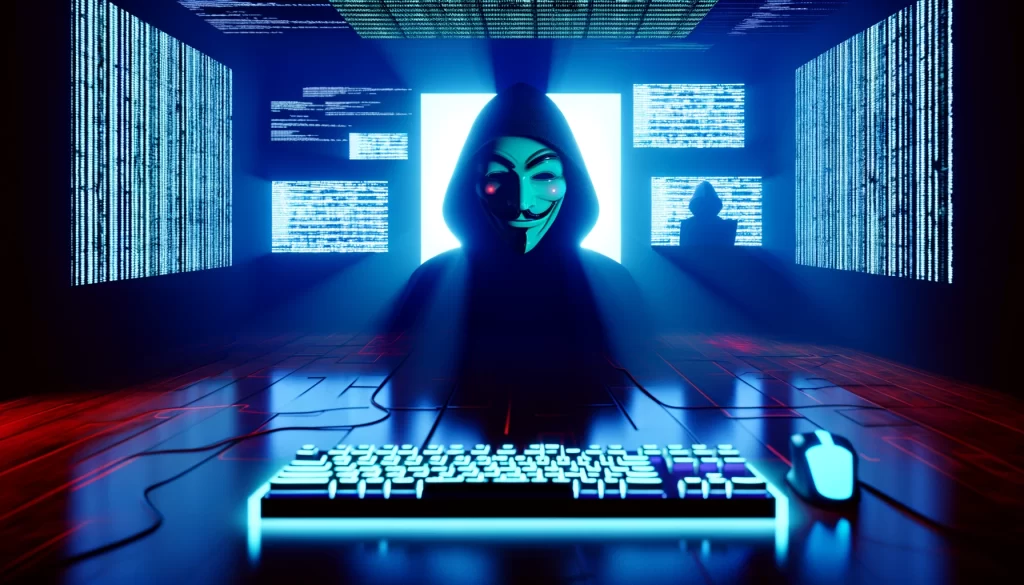The enigmatic collective known as Anonymous has remained one of the most influential and controversial groups in the realm of digital activism and cyber operations. Emerging from the chaotic creativity of the internet, particularly from forums like 4chan, Anonymous has evolved from a loosely affiliated group of individuals seeking entertainment and mischief into a banner under which various cyber-activist operations have been launched. The collective’s actions, ranging from pranks to serious cyber-attacks against government, religious, and corporate websites, have spurred debates on the nature of digital activism, freedom of speech, and the boundaries of legality on the internet.

Origins and Evolution
Anonymous initially gained attention in the mid-2000s, born out of the imageboard 4chan, a place known for its lack of censorship and a culture of anonymity. The group’s name itself, “Anonymous,” is derived from the default name assigned to every poster on 4chan. Early activities were primarily focused on internet subculture, but by 2008, the collective had shifted towards more significant, politically charged operations.
The transformation of Anonymous from internet trolls to a symbol of digital protest is often attributed to the 2008 Project Chanology, a campaign against the Church of Scientology. This marked a pivotal point, demonstrating the potential of collective, anonymous action in achieving real-world impact. From this point, Anonymous’s activities broadened to include support for Wikileaks, involvement in the Arab Spring, operations against ISIS, and various campaigns for freedom of speech and against censorship.
Decentralized Nature
A key aspect of understanding Anonymous is recognizing its decentralized, amorphous nature. There is no official membership, hierarchy, or centralized command structure. This lack of formal organization allows for a fluid membership, with individuals and groups operating under the Anonymous banner as they see fit. This structure, or lack thereof, complicates efforts to define or even prosecute the group as a whole, as it operates more as an idea or a movement than a traditional group.
The decentralized nature of Anonymous poses a challenge in identifying who is “really” behind the group. Participants vary widely in their objectives, tactics, and political beliefs, ranging from mere pranksters to highly skilled hackers advocating for substantial social and political changes. The collective nature of Anonymous allows it to morph and adapt, with different factions focusing on issues as diverse as internet freedom, social justice, and transparency in governance.
The Role of Hacktivism
Hacktivism, a portmanteau of hacking and activism, is a defining characteristic of Anonymous’s operations. The collective has been responsible for numerous high-profile cyber-attacks, often targeting websites and services to protest against various policies or actions. These have included DDoS attacks, website defacements, and leaks of confidential information. While some view these actions as legitimate protests against perceived injustices, others criticize them as illegal and unethical.
The effectiveness of hacktivism is debated. Supporters argue that it brings attention to important issues and can pressure organizations and governments to change policies. Critics, however, point out the potential for collateral damage, legal repercussions, and the ethical implications of hacking.
Anonymous in the Media and Public Perception
The portrayal of Anonymous in the media has been varied, with the collective being seen alternately as freedom fighters, vigilantes, and cyber terrorists. This disparity in views reflects the complex nature of Anonymous’s actions and the diverse motivations of those operating under its banner. The iconic “Guy Fawkes” mask, popularized by the graphic novel and film “V for Vendetta,” has become a symbol of the group, embodying the idea of rebellion against tyranny.
Public perception of Anonymous is similarly divided. Some celebrate the group as a necessary counterbalance to government and corporate power, while others view its actions as reckless and harmful. This division is further complicated by the group’s lack of a coherent ideology or unified leadership, leading to actions that can sometimes appear contradictory.
Challenges and Future
The future of Anonymous is as uncertain as its origins. The collective’s decentralized nature allows it to persist even as individual participants come and go. However, this same characteristic makes it difficult for the group to maintain a consistent direction or achieve long-term goals.
Moreover, the increasing sophistication of cybersecurity measures and the legal crackdown on cyber-activities pose significant challenges to Anonymous and similar groups. As governments and organizations become better equipped to deal with cyber-attacks, the effectiveness of hacktivism as a tool for social or political change may diminish.
In conclusion, the question of who is “really” behind Anonymous is perhaps unanswerable, given the collective’s decentralized and amorphous nature. Anonymous represents a complex phenomenon in the digital age, embodying the potential for grassroots activism in the internet era but also highlighting the ethical and legal dilemmas posed by cyber-activism. As the digital landscape continues to evolve, so too will the role and impact of groups like Anonymous, reflecting the ongoing struggle between the power structures of the old world and the disruptive potential of the new.
teach me how to hack
Can the bank?